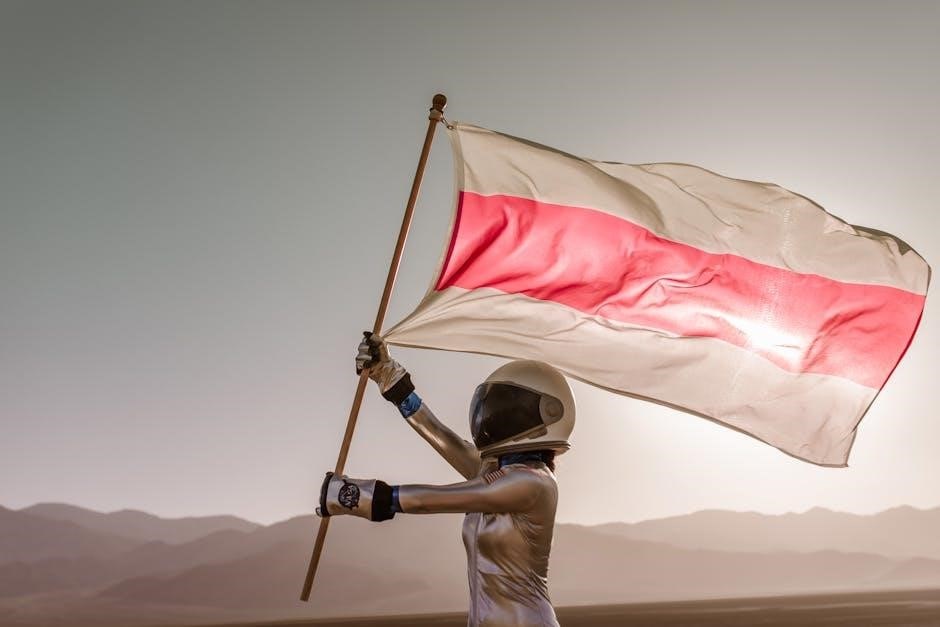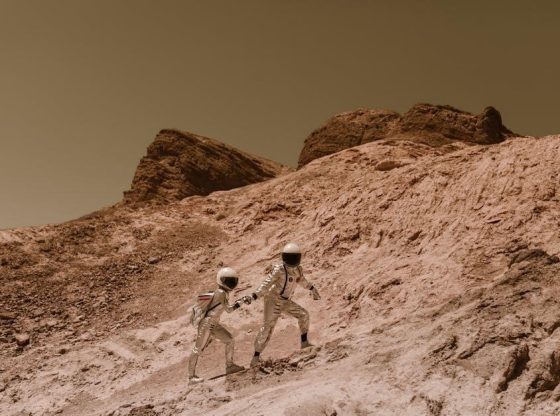The Martian Chronicles by Ray Bradbury is a seminal work of science fiction, first published in 1950, now widely available as a PDF for easy reading.
Overview of the Book
The Martian Chronicles by Ray Bradbury is a collection of interconnected short stories that explore humanity’s colonization of Mars. The book weaves together themes of exploration, technology, and human nature, blending science fiction with poetic prose. First published in 1950, it remains a timeless classic, offering insights into the hopes and fears of a society reaching for the stars. Its emotional depth and philosophical questions continue to resonate, making it a must-read in the science fiction genre, now widely available as a PDF for modern readers.
Significance of the Title
The title The Martian Chronicles reflects the book’s narrative structure, presenting a series of vignettes that chronicle humanity’s colonization of Mars. It evokes a sense of historical documentation, framing the stories as a record of pivotal events. The term “Chronicles” suggests a epic and timeless account, emphasizing the universal themes of exploration, transformation, and the human condition. This title encapsulates Bradbury’s vision of Mars as both a physical and metaphorical frontier, now accessible to readers worldwide through its PDF format.
Author Background: Ray Bradbury
Ray Bradbury, born on August 22, 1920, in Waukegan, Illinois, was a celebrated American author known for blending science fiction, fantasy, and horror. His lyrical prose and exploration of human emotion set him apart. Bradbury’s work often delved into futuristic themes, moral dilemmas, and the human condition. He gained fame with novels like Fahrenheit 451 and Dandelion Wine. The Martian Chronicles showcases his ability to weave compelling narratives, blending science fiction with philosophical insights, making him a cornerstone of 20th-century literature.

Structure and Composition
The Martian Chronicles is structured as a collection of interconnected short stories, forming a cohesive narrative that explores humanity’s colonization of Mars chronologically.
Interconnected Short Stories
The Martian Chronicles is uniquely structured as a collection of short stories that intertwine to form a cohesive narrative. Each story explores different aspects of humanity’s colonization of Mars, blending individual tales with overarching themes. While the stories can stand alone, they collectively create a rich tapestry of human ambition, failure, and transformation. Bradbury’s approach allows readers to witness the evolution of Mars as a setting and the profound changes it inspires in those who inhabit it.
Chronological Progression
The Martian Chronicles unfolds across multiple decades, tracing humanity’s colonization of Mars from initial exploration to eventual settlement. The narrative progresses chronologically, with each story building on the previous one, creating a seamless flow. Bradbury’s timeline begins with Earth’s first expeditions to Mars and concludes with a transformed planet, exploring themes of hope, loss, and renewal. This structure allows readers to witness the evolution of humanity’s relationship with Mars and its profound impact on both worlds.
Themes and Motifs
The Martian Chronicles explores timeless themes such as humanity’s dual nature, the allure of the unknown, and the consequences of technological advancement. Motifs like fire, symbolizing destruction and renewal, and the rocket, representing ambition and escape, weave through the narrative. Bradbury’s work delves into nostalgia for a lost Earth and the clash between progress and tradition, creating a rich tapestry of ideas that resonate deeply with readers. These elements underscore the book’s enduring relevance and philosophical depth.

Key Themes Explored
The Martian Chronicles delves into colonization, humanity’s flaws, technological hubris, and nostalgia, reflecting on progress, identity, and the clash between tradition and innovation.
Colonization and Its Implications
The novel critiques the ethics and consequences of colonization, mirroring historical events like the treatment of Native Americans. Bradbury explores how humanity repeats its mistakes, exploiting Mars for resources and displacing its indigenous inhabitants. The narrative highlights the tension between progress and preservation, questioning the morality of imposing human dominance on another world. This theme serves as a cautionary tale, urging reflection on the consequences of unchecked expansion and the erasure of alien cultures.
Human Nature and Society
The Martian Chronicles delves into the complexities of human nature, revealing both the noble and darker aspects of society. Bradbury portrays humanity’s innate curiosity and drive for exploration, alongside its propensity for greed, violence, and repetition of past mistakes. The novel critiques societal tendencies like conformity and the exploitation of the unknown, using Mars as a mirror to reflect Earth’s dilemmas. It invites readers to ponder the resilience and flaws of human civilization, emphasizing the need for self-awareness and moral growth in the face of progress and colonization.
Technology and Progress
The Martian Chronicles explores the dual nature of technology and progress, presenting them as both marvels and catalysts for destruction. Bradbury uses rockets and advanced machinery as symbols of human ingenuity, yet critiques the unchecked pursuit of innovation. The novel highlights how technological advancements often outpace moral growth, leading to exploitation and dehumanization. Mars serves as a canvas where humanity’s obsession with progress clashes with the planet’s delicate environment, raising questions about the true cost of “civilization” and the balance between innovation and preservation.
Nostalgia and Longing
Nostalgia and longing are central emotional currents in The Martian Chronicles. Bradbury captures the human yearning for a lost past, as characters reflect on Earth’s comforts and Mars’ unknowns. The novel often juxtaposes the excitement of exploration with the ache of leaving behind cherished memories. This duality underscores the tension between progress and the irrevocable loss of innocence. Through these themes, Bradbury explores the bittersweet nature of change and the enduring human connection to what is left behind.

Major Characters and Their Roles
Major characters include Captain Wilder, a determined leader, Mr. Spender, a philosophical thinker, Jeff Spender, a conflicted soul, and the enigmatic Martians, symbolizing wisdom and cultural clash;
Protagonists and Their Journeys
The protagonists, such as Captain Wilder and Mr. Spender, embody humanity’s quest for exploration and understanding. Captain Wilder leads with determination and practicality, while Mr. Spender symbolizes philosophical introspection. Jeff Spender, conflicted and idealistic, grapples with humanity’s flaws. Their journeys reflect personal growth, moral dilemmas, and the clash between progress and preservation. Each character’s arc explores themes of identity, purpose, and the consequences of human ambition, set against the backdrop of Mars’ mysterious landscape.
Antagonists and Their Impact
The antagonists in The Martian Chronicles include the enigmatic Martian natives and the oppressive forces of human colonization. The Martians, with their telepathic abilities, resist human intrusion, symbolizing the unknown and the consequences of invasion. Additionally, human antagonists, such as those driven by greed or destruction, highlight the darker aspects of human nature. These antagonists challenge the protagonists, driving the narrative’s exploration of colonialism, identity, and the clash between progress and preservation. Their impact shapes the story’s themes of conflict and transformation.
Symbolic Characters
In The Martian Chronicles, symbolic characters like Mr. Spallner and the Martian girl embody deeper themes. Mr. Spallner represents skepticism and doubt, questioning humanity’s conquest of Mars. The Martian girl symbolizes the clash of cultures and the fragile coexistence between humans and Martians. These characters serve as metaphors for broader ideas, such as the consequences of human ambition and the loss of innocence. Their roles illuminate the novel’s exploration of identity, morality, and the unknown.

Setting: Mars as a Central Element
Mars serves as both a physical and symbolic backdrop, exploring humanity’s colonization attempts and existential reflections. Its alien landscape shapes the narrative’s themes of exploration and transformation.
Description of the Martian Environment
The Martian environment in Bradbury’s work is vividly depicted as a hauntingly beautiful yet desolate landscape. The planet’s thin atmosphere, vast plains, and distant mountains create an otherworldly backdrop. The sky, often described as a deep, bloody red, adds to the eerie atmosphere. Bradbury’s Mars is a place of contrasts, where ancient rivers and canals whisper of a once-thriving civilization, now reduced to silence and dust. The environment mirrors humanity’s emotional and existential struggles, blending wonder with foreboding.
Contrast Between Mars and Earth
In The Martian Chronicles, Mars and Earth are portrayed as stark contrasts. Mars, with its thin atmosphere, crimson skies, and barren landscapes, symbolizes the unknown and humanity’s quest for escape. Earth, teeming with life and chaos, represents familiarity and the flaws of human society. The contrast highlights humanity’s dual nature: the pursuit of utopia on Mars versus the destruction of Earth. This duality underscores Bradbury’s exploration of hope, loss, and the human condition.
Mars as a Symbol of Hope and Desolation
Mars in The Martian Chronicles symbolizes both hope and desolation. It represents humanity’s longing for a new beginning, offering escape from Earth’s chaos. Yet, the planet’s stark, alien beauty and unforgiving environment mirror the emptiness and disillusionment of those who settle there. Bradbury uses Mars to explore themes of transformation and tragedy, reflecting humanity’s capacity for both idealism and self-destruction. The planet becomes a mirror of human aspirations and their inevitable confrontation with reality.

Cultural and Historical Context
Published in 1950, The Martian Chronicles reflects post-WWII anxieties, Cold War fears, and technological optimism. Bradbury’s Midwestern roots and skepticism of progress deeply shaped the narrative.
Publication History and Reception
The Martian Chronicles was first published in 1950 by Doubleday, initially titled The Silver Locusts in the UK. The book received mixed reviews at release, with some critics praising its poetic prose while others found its structure unconventional. Over time, it gained acclaim for its unique blend of science fiction and social commentary, solidifying its place as a classic in the genre. Its exploration of human ambition and ethics resonated widely, cementing Bradbury’s legacy as a visionary author.
Impact on Science Fiction Genre
The Martian Chronicles revolutionized science fiction by blending poetic prose with philosophical themes, setting a new standard for literary depth in the genre. Bradbury’s exploration of human emotions, ethics, and societal issues expanded sci-fi’s scope beyond technological speculation. The book influenced countless authors, inspiring introspective storytelling in science fiction. Its unique narrative structure and moral inquiries continue to shape the genre, making it a foundational work that remains relevant in modern sci-fi literature and adaptions.
Historical Influences on the Narrative
The narrative of The Martian Chronicles was shaped by the post-World War II era, reflecting Cold War anxieties and the dawn of the space age. Bradbury’s depiction of Mars colonization mirrors 1950s American optimism and fears of nuclear destruction. The book also draws from historical themes of exploration and imperialism, blending them with futuristic elements. These influences create a timeless story that critiques human ambition while exploring universal themes of hope and loss.

Symbolism and Metaphors
Rockets symbolize humanity’s quest for progress and escape, while fire represents destruction and transformation. These elements weave together to explore deeper themes of human ambition and fragility.
The Rocket as a Symbol
The rocket in The Martian Chronicles symbolizes humanity’s dual pursuit of progress and escape. It embodies the hope of exploration and the anxiety of the unknown. As a recurring image, it ties together the interconnected stories, serving as both a physical and metaphorical bridge between Earth and Mars. The rocket underscores the tension between advancement and the fragility of human endeavors.
Martian Civilizations
The novel portrays Martian civilizations as ancient, enigmatic, and eventually extinct. These civilizations are depicted as advanced yet fragile, their downfall hinting at the transience of progress. Bradbury uses them to mirror humanity’s flaws, such as hubris and complacency, while evoking a sense of mystery and loss. Their remnants serve as a cautionary tale, reflecting on humanity’s potential fate if it repeats similar mistakes on Mars;
Fire and Its Significance
Fire serves as a powerful symbol in The Martian Chronicles, representing both destruction and transformation. It signifies humanity’s dual nature: the capacity for creation and annihilation. Bradbury often uses fire to illustrate the clash between progress and tradition, as well as the fragility of civilization. The recurring imagery of flames underscores themes of renewal and the cyclical nature of history, while also highlighting the dangers of unchecked technological advancement and human ambition.

Adaptations and Interpretations
The Martian Chronicles has been adapted into various forms, including TV series, films, and stage plays, each offering unique interpretations of Bradbury’s visionary narrative.
Television and Film Adaptations
The Martian Chronicles has inspired several television and film adaptations, including the 1980 miniseries starring Rock Hudson, which captured the essence of Bradbury’s cosmic vision. More recent adaptations, such as the 2020 TV series, have reimagined the narrative for modern audiences, blending stunning visuals with the timeless themes of colonization and humanity. These adaptations highlight the enduring appeal of Bradbury’s work, translating his poetic prose into compelling screenplays that resonate across generations.
Stage Productions
Several stage productions have brought The Martian Chronicles to life, adapting its vivid narrative into theatrical experiences. These plays often use minimalist sets and creative storytelling to capture Bradbury’s imaginative vision. The challenges of translating futuristic elements into live performances have inspired innovative solutions, such as projection mapping and atmospheric soundscapes. These adaptations highlight the book’s universal themes, offering audiences a unique perspective on colonization and humanity. They remain a testament to Bradbury’s enduring influence on storytelling across mediums.
Comic Book and Graphic Novel Versions
The Martian Chronicles has been adapted into several comic book and graphic novel versions, offering visual interpretations of Bradbury’s themes. Publishers like Hill and Wang and Top Shelf Productions have transformed the narrative into illustrated formats, blending text with artwork. These adaptations capture the book’s essence, presenting Mars’ haunting landscapes and humanity’s struggles in a new medium. They provide fresh perspectives, appealing to both longtime fans and new readers, while staying true to Bradbury’s visionary storytelling.

Reception and Reviews
The Martian Chronicles received widespread acclaim for its poetic prose and haunting themes. Critics praised its unique blend of science fiction and social commentary, solidifying its status as a timeless genre classic.
Critical Acclaim
The Martian Chronicles has been hailed as a masterpiece of speculative fiction, praised for its lyrical prose and profound exploration of humanity. Critics have lauded Bradbury’s ability to weave morality, philosophy, and emotion into a compelling narrative. The book’s vivid imagery and timeless themes have earned it a place among classic literature. Reviewers often highlight its thought-provoking commentary on colonialism, technology, and human nature, making it a standout work in the science fiction genre. Its enduring popularity underscores its literary significance.
Controversies and Criticisms
While The Martian Chronicles is widely admired, it has faced criticism for its portrayal of colonialism and its treatment of indigenous Martians. Some argue that Bradbury romanticizes colonial expansion while failing to fully critique its ethical implications. Additionally, the book’s nostalgic tone has been criticized for overshadowing its darker themes. Despite these critiques, the novel remains a significant work, sparking debates about humanity’s relationship with technology and the environment. Its complex themes continue to provoke thought and discussion.
Reader Feedback and Popularity
The Martian Chronicles has garnered a loyal fan base since its release, with readers praising its poetic prose and thought-provoking themes. Many appreciate its blending of science fiction with philosophical reflections, while others highlight its emotional depth. Some readers note that the book’s episodic structure can feel disjointed, but overall, it remains a beloved classic. Its exploration of human nature and futuristic scenarios continues to resonate, making it a frequently recommended read in science fiction circles.

Legacy and Influence
The Martian Chronicles has profoundly shaped science fiction, inspiring countless authors and adaptations. Its poetic prose and timeless themes continue to influence literature and popular culture.
Impact on Literature
The Martian Chronicles has left an indelible mark on literature, redefining science fiction with its poetic prose and philosophical depth. Bradbury’s unique blend of fantasy and realism inspired a generation of writers, encouraging experimentation in genre storytelling. The book’s exploration of human themes through a sci-fi lens has influenced authors across genres, embedding its legacy in both literary and popular culture. Its enduring relevance continues to inspire new voices in literature and beyond.
Influence on Popular Culture
The Martian Chronicles has profoundly influenced popular culture, inspiring numerous adaptations, including TV shows, films, and radio dramas. Its themes of space exploration and humanity’s relationship with technology have sparked discussions across media. The book’s iconic imagery, such as Martian landscapes and futuristic societies, has shaped visual storytelling in science fiction. Its influence is evident in works like The Twilight Zone and films exploring similar existential themes, cementing its role in shaping cultural narratives about space and humanity.
Modern Relevance
The Martian Chronicles remains strikingly relevant today, exploring themes like technological hubris, environmental destruction, and humanity’s quest for meaning. Bradbury’s cautionary tales about colonization and cultural clashes resonate amid modern debates on imperialism and climate change. The book’s reflection on isolation and connectivity also mirrors contemporary concerns about technology’s impact on society. Its timeless questions about humanity’s place in the universe continue to provoke thought, making it a vital read in an era of rapid change and global challenges.
The Martian Chronicles concludes with profound reflections on humanity’s relationship with technology and society, offering timeless questions about our collective future and the universe’s mysteries.
Final Thoughts on the Book
The Martian Chronicles is a timeless blend of science fiction and poetic prose, exploring humanity’s ambitions, flaws, and the paradox of progress. Bradbury’s vivid storytelling weaves a tapestry of hope, despair, and reflection, making Mars a mirror to Earth’s societal struggles. The book’s emotional depth and philosophical questions resonate deeply, leaving readers to ponder the consequences of human endeavors. Its enduring relevance underscores Bradbury’s genius in crafting a narrative that transcends its genre.
Recommendations for Readers
The Martian Chronicles is a must-read for fans of science fiction and philosophical literature. Its unique blend of poetic prose and futuristic themes makes it accessible to both new and seasoned readers. Those interested in exploring humanity’s complexities will find it deeply rewarding. The book’s timeless questions about technology and society ensure its relevance today. Available in formats like PDF, it remains a compelling choice for anyone seeking a thought-provoking and emotionally resonant story.
Future of The Martian Chronicles
The Martian Chronicles continues to captivate readers, ensuring its enduring relevance. With its exploration of humanity, technology, and existential themes, it remains a cornerstone of science fiction. As digital formats like PDF make it more accessible, new generations can discover its timeless appeal. Its influence on literature and popular culture guarantees its lasting impact, solidifying its place as a classic that will resonate for years to come.

